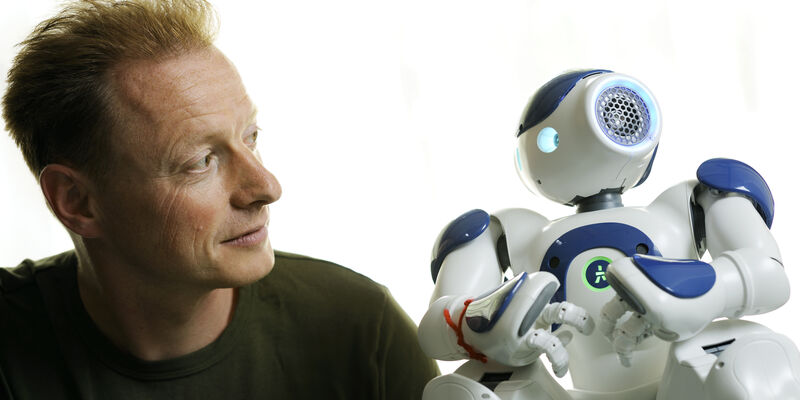
- Research
- 16/10/2015
“Robotisation should not lead to dehumanization”
From drones to autonomous vehicles to healthcare and even sex robots. Ethicist of technology Lambèr Royakkers is following developments closely, with a mixture of enthusiasm and shivers. Last month saw the publication of the book Just Ordinary Robots, which he wrote together with his colleague Rinie van Est.
The days when the presence of robots was confined to the safe, controlled environment of factory halls have gradually passed away. Step by step robots are going to form part of the real society. On the battlefield robots have meanwhile made their entrance – think of autonomous drones – and in the street as well as in our households we shall see more and more intelligent mechanical assistants popping up in the years ahead.
Mr.dr.ir.ir. Lambèr Royakkers (he studied law, mathematics and philosophy, and obtained his PhD with an ethical-philosophical thesis) has engrossed himself in this development over the past few years. The question whether the accession of robots to the real society will have a positive or negative effect is followed by a pregnant silence. “Phew, that’s a tough question.”
It is not a foregone conclusion for this Associate Professor that robots will actually enrich our lives. In his view the greatest risk of robots is not that they will oust people from the labor market, nor even the prospect of a new arms race involving autonomous fighting robots, although the latter idea seriously worries him. No, in his heart of hearts Royakkers expects the greatest danger lies in domestic robots. The seemingly innocent healthcare robots, seductive sex robots and all intermediate variants still to be developed in the coming years.
“If before long we have a robot that can help patients put on their TED socks, assist elderly people to go to the bathroom and make sure they take their medicines, will nursing staff be made redundant due to cutbacks? Or are we going to decide that human interaction is of the essence in ‘caring for’, that emotional and personal involvement are important?”
The greatest danger lies in domestic robots
For the time being, healthcare robots will not claim a prominent place in our lives yet, the expert thinks. The state of the art has not progressed far enough for this. Sex robots, on the other hand, will become a hype within a matter of years, he predicts. “However, what place will be left for sexuality in a relation if we can soon have the best sex with a specially designed robot?” And following naturally from this: what role will be left for friendship if you can have animated conversations with widely-read companion robots (who have the entire Internet at their disposal in their digital brains) who have been designed in such a way also as to avoid arguments, never to disagree really or put you in your place? “I’m afraid that people will decide on the convenient company of robots and will consequently lose a portion of their social skills.”
Besides, there is another serious drawback inherent in the ‘liberation’ of robots from their factory environment: we shall have to adapt our everyday environment to the newcomers. For a robotic vacuum cleaner or a robotic lawnmower your house needs to be tidied up somewhat, and the garden cannot be very uneven. The result is that people will adapt their environment to robots, and the question again is whether we really want this.
In short: while you would want the robot to be tailor-made for humans, humans will in practice also (need to) adapt to robots. Which brings us back to the sixty-four thousand dollar question: are those robots really such a good idea? They are, says Royakkers, after having reflected on this for a while, but under strict conditions. “Although robots supporting humans are a great development, they should not take over the role of humans. We need to guard against robotisation resulting in deterioration of human life.”
Discussion